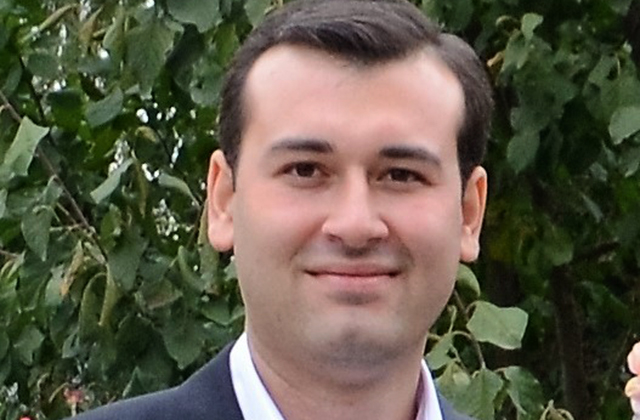Armenia should be ready for Russia-Turkey scenario, promising “settlement” in NK issue: Eduard Abrahamyan

“The information that Russian Aerospace Defense Forces supported the Turkish army, undertaking military operations north of al-Bab in the Aleppo Governorate, proves that Putin isn’t against presence of Turkish troops in Syria,” Eduard Abrahamyan, expert on NATO strategy, intelligence, security and strategy researcher at the Leicester University (United Kingdom), fellow at Policy Forum Armenia, based in Washington DC, told 168.am, commenting on information that these days for the first time Russian air forces supported Turkish forces in Syria by launching an assault against the Islamic State north of al-Bab.
Eduard Abrahamyan stated that, first and foremost, it’s necessary to state that Erdogan’s “Euphrates Shield” project, supposing penetration to northern regions of Syria along Euphrates River to Aleppo’s northern side, was conditioned by Moscow.
Moreover, he considers Turkey’s purpose was one—not allowing unification of YPG military groups with Aleppo Kurds, which were separated by mostly Sunni populated settlements along Euphrates River under the control of the Islamic State.
“The Russian side observes Turkey’s regional aspirations, internal developments against the background of Russia-Turkey rapprochement, as a Trojan horse to generate tension inside NATO. From Moscow’s perspective, the more Ankara approaches Russia and gets more engaged with regional processes, bypassing to agree the operations within North-Atlantic Council, it’ll generate new crisis basis, due to which the Kremlin will come out wining.
Turkmen groups comprising a part of Syrian anti-Assad opposition by Russia, which function under the defense of Turkey, are already perceived by Moscow as a moderate opposition.
Moreover, the information that Russian Aerospace Defense Forces provided fire assistance to support the Turkish army, undertaking military operations north of al-Bab in the Aleppo Governorate, proves that Putin isn’t against presence of Turkish troops in Syria. Moreover, for Assad and Erdogan Kurds are also considered as adversary and here Erdogan-Putin-Assad union is being shaped, which is directed not only against the Islamic State, but against Kurds as well, who in Iraq and Syria are considered as functioning focal point of the West and, particularly, of the USA,” Eduard Abrahamyan said.
The latter considers, the fact that Turkey has initially requested air assistance from the coalition led by the USA, is worth attaching attention to, however, it didn’t have an operative answer and applied to Russian forces, on the other hand, recently the White House and the U.S. Congress passed a decision to more actively support Syrian opposition forces with armaments. According to the analyst, this means that particularly Kurdish forces will have military support in Syria’s north and will create serious obstacles in implementation of the “Euphrates Shield” project.
Reflecting to implications of Russia-Turkey rapprochement for Armenia, Abrahamyan stated that it may lead to serious after-effects. In his words, the point is that one of the hindrances to Russia-Turkey rapprochement is existent Armenia-Azerbaijan conflict.
“Thus, it’s not excluded that Putin and Erdogan will come to an agreement in activating the process around Karabakh issue. Both Turkey and Russia are Minsk Group members. Moreover, after the April developments Russia became more active and undertaking between the co-chairs. Out of this, and the fact that the South Caucasus is traditionally observed by Putin as a region of its absolute dominance, will entitle itself to take a decisive posture in the Minsk Group. Thus, Russia-Turkey agreements in Syria and general rapprochement will create conditions for more active Russia-Turkey cooperation within the Minsk Group in the forthcoming 2017.
The administrative mess of the U.S. elect president Donald Trump in the first half of the year makes raising the issue by Ankara and Moscow favorable, which won’t allow the U.S. to re-interpret main agenda of its policy in the Black Sea—South Caucasus region throughout 2017. Moreover there is a serious concern that the new U.S. Government will attempt to find certain cutting edges with Putin and basically accept Putin’s leading role in the South Caucasus or Ukrainian issue. This perspective will mostly contribute to appearance of joint Russia-Turkey project to “settle” Karabakh conflict. It’ll probably involve a wide arsenal of exerting pressure over Armenia and Azerbaijan by Turkey.
The mechanism of exerting pressure over continuous, comprehensive and miscellaneous layers against Armenia and Azerbaijan is becoming more realistic to the sense that Moscow and Turkey will become main actors-mediators, which will “provide” a situation of mutual concessions both by Armenia and Azerbaijan.
It may be a scenario containing wide actions, directed to manipulation of the societies of Armenia and Azerbaijan, mostly misinform the societies of the parties to the conflict through fake threat wave and constant propaganda, for the purpose of extracting concession through threats,” Eduard Abrahamyan said.
According to the latter’s assessment political possibilities of Armenia’s foreign policy are in a desperate condition and until now aren’t distinguished by clear foreign policy strategy. He considers in the context of this reality it’s impossible to prevent Russia-Turkey rapprochement and hazardous implications. “Thus, Armenia should be ready to Russia-Turkey scenario, promising “settlement” in Artsakh issue,” Eduard Abrahamyan said.
By Araks Martirosyan

























